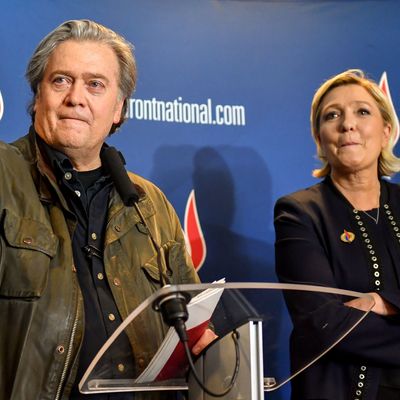
In 1991, Pat Robertson, the Christian Right’s most influential leader, wrote a book titled The New World Order. It received almost no attention — who wants to slog through a Pat Robertson book? — until four years later, when Michael Lind called attention to it in the New York Review of Books. Lind’s review provoked a furor by revealing the fantastical conspiracy theory Robertson had unspooled, in which a cabal of “European bankers” had secretly orchestrated two centuries of world events for their personal benefit.
Some of the furor centered on whether Robertson or his worldview should be described at anti-Semitic. In his defense, Robertson insisted that the book made no explicit reference to Jews as the architects of the nefarious global conspiracy he claimed to uncover. This defense was true, as far as it goes. Robertson had essentially removed references to Jews while preserving the framework of a classic anti-Semitic theory. It was anti-Semitism minus Jews.
The divide around which this argument took place is the same grounds upon which President Trump and his defenders argue that they have no relationship with, or responsibility of any kind for, Robert Bowers’s murderous rampage in Pittsburgh. “The evil act of anti-Semitism in Pittsburg was committed by a coward who hated President Trump because @POTUS is such an unapologetic defender of the Jewish community and state of Israel,” insists White House press secretary Sarah Sanders, denouncing press coverage linking Trump’s rhetoric to both the pro-Trump bomber Cesar Sayoc and Bowers.
The far-right faction with which Bowers identifies does oppose Trump as a pro-Jewish sellout, citing such betrayals as his support for Israel and the marriage of his daughter to a Jewish man. Those differences between Trump and murderous anti-Semites are hardly trivial.
Still, Bowers does identify with some of Trump’s goals and rhetoric, because Trump has inspired the racist far right to a degree surpassing any modern American president. His depiction of immigrants as inherently criminal, and his attempts to connect immigration to shadowy cabals of financiers, closely track white supremacist tropes. During the 2016 campaign, Trump has inadvertently slipped over the line between explicit and implicit anti-Semitism when he tweeted out a meme produced by anti-Semites calling Hillary Clinton the “most corrupt candidate ever!” inside a Star of David. (The star signaled to anti-Semites that Clinton’s alleged corruption was in reality a form of control by the Jews.)
More often, he would invoke anti-Semitic themes without any explicit reference to Jews or Judaism. Trump’s closing campaign ad on television denounced “a global power structure that is responsible for the economic decisions that have robbed our working class, stripped our country of its wealth and put that money into the pockets of a handful of large corporations and political entities,” over images of Janet Yellen, George Soros, and Lloyd Blankfein, all of whom happen to be Jewish. Trump lambastes his enemies as “globalists,” which, through its implication of extra-national loyalty, closely tracks the primary accusation made against Jews.
Most right-wing thought in general tends to laud the traditional values found in ethnically homogenous rural areas (“real America,” as conservatives habitually call it), and to censure the cosmopolitanism and libertine values of the cities. As a largely urban, educated, and liberal group, Jews naturally find themselves on the negative side of this implicit moral divide. The more sinister strains of this thinking develop conspiracy theories connecting the role of elites and the larger numbers of foreign hordes who seem to pose a threat to the nation’s character.
These elites can be easily identified as Jews, but doing so is not necessary. The theories still work reasonably well without identifying Jews per se. Phyllis Schlafly, an influential conservative author and activist, long argued that a shadowy Eastern cabal had controlled the Republican party and deliberately led it to defeat. The villains in her narrative were sometimes Jewish. “Henry, say some who know him well, has no God,” she wrote of Henry Kissinger, a bête noire of the movement, “Does he have a country?” But for the most part, Schlafly’s theories did not require her enemies to be identifiably Jewish.
Lou Dobbs, a fervent pro-Trump nationalist, recently endorsed the common right-wing theory that George Soros was secretly financing a caravan of refugees making its way through Latin America:
Pat Robertson’s creepy screed faded from memory in part because the conservative movement locked arms behind a man who supplied millions of votes for the party. The conservative Jewish intellectual Norman Podhoretz wrote a long defense absolving Robertson of anti-Semitism — or, at least, of anti-Semitism beyond levels Podhoretz deemed reasonable. (“It is the simple truth,” argued Podhoretz, “that most American Jews are liberals (about 75 percent, if their voting behavior is taken as the yardstick) and that, as such, they have lined up behind policies that are repugnant to the conservative Christian community.”)
It is probably not surprising that the conspiratorial style of Schlafly and Robertson, having met such weak resistance, have made their way closer to the center of the Republican party. If the president was an anti-Semite, matters would indeed be much worse for American Jews than they currently are. But short of such an emergency, having a president who endorses deranged right-wing nationalist conspiracy theories is dangerous enough.






























